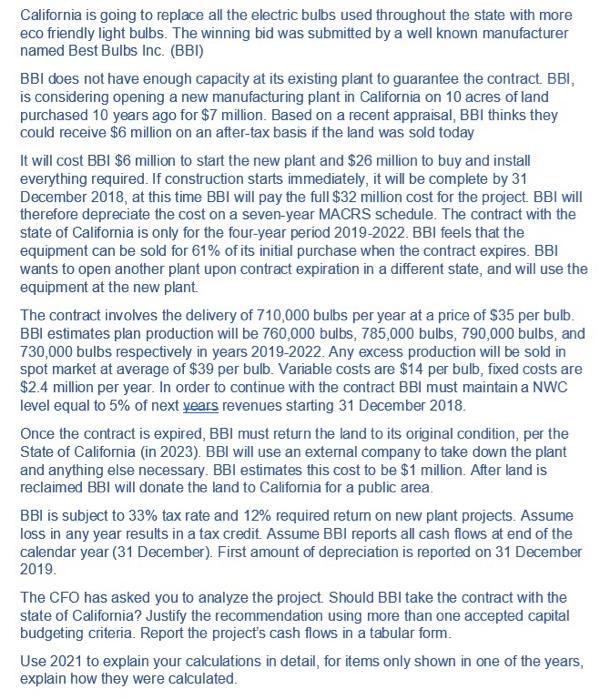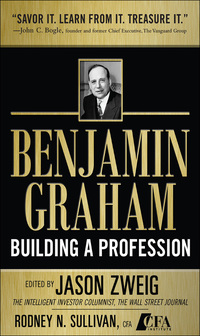California is going to replace all the electric bulbs used throughout the state with more eco friendly light bulbs. The winning bid was submitted by a well known manufacturer named Best Bulbs Inc. (BBI) BBI does not have enough capacity at its existing plant to guarantee the contract BBI, is considering opening a new manufacturing plant in California on 10 acres of land purchased 10 years ago for $7 million. Based on a recent appraisal, BBI thinks they could receive $6 million on an after-tax basis if the land was sold today It will cost BBI $6 million to start the new plant and $26 million to buy and install everything required. If construction starts immediately, it will be complete by 31 December 2018, at this time BBI will pay the full $32 million cost for the project. BBI will therefore depreciate the cost on a seven-year MACRS schedule. The contract with the state of California is only for the four-year period 2019-2022. BBI feels that the equipment can be sold for 61% of its initial purchase when the contract expires. BBI wants to open another plant upon contract expiration in a different state, and will use the equipment at the new plant. The contract involves the delivery of 710,000 bulbs per year at a price of $35 per bulb. BBI estimates plan production will be 760,000 bulbs, 785,000 bulbs, 790,000 bulbs, and 730,000 bulbs respectively in years 2019-2022. Any excess production will be sold in spot market at average of $39 per bulb. Variable costs are $14 per bulb, fixed costs are $2.4 million per year. In order to continue with the contract BBI must maintain a NWC level equal to 5% of next years revenues starting 31 December 2018. Once the contract is expired, BBI must return the land to its original condition, per the State of California (in 2023). BBI will use an external company to take down the plant and anything else necessary. BBI estimates this cost to be $1 million. After land is reclaimed BBI will donate the land to California for a public area. BBI is subject to 33% tax rate and 12% required return on new plant projects. Assume loss in any year results in a tax credit. Assume BBI reports all cash flows at end of the calendar year (31 December). First amount of depreciation is reported on 31 December 2019. The CFO has asked you to analyze the project Should BBI take the contract with the state of California? Justify the recommendation using more than one accepted capital budgeting criteria. Report the project's cash flows in a tabular form. Use 2021 to explain your calculations in detail, for items only shown in one of the years, explain how they were calculated. California is going to replace all the electric bulbs used throughout the state with more eco friendly light bulbs. The winning bid was submitted by a well known manufacturer named Best Bulbs Inc. (BBI) BBI does not have enough capacity at its existing plant to guarantee the contract BBI, is considering opening a new manufacturing plant in California on 10 acres of land purchased 10 years ago for $7 million. Based on a recent appraisal, BBI thinks they could receive $6 million on an after-tax basis if the land was sold today It will cost BBI $6 million to start the new plant and $26 million to buy and install everything required. If construction starts immediately, it will be complete by 31 December 2018, at this time BBI will pay the full $32 million cost for the project. BBI will therefore depreciate the cost on a seven-year MACRS schedule. The contract with the state of California is only for the four-year period 2019-2022. BBI feels that the equipment can be sold for 61% of its initial purchase when the contract expires. BBI wants to open another plant upon contract expiration in a different state, and will use the equipment at the new plant. The contract involves the delivery of 710,000 bulbs per year at a price of $35 per bulb. BBI estimates plan production will be 760,000 bulbs, 785,000 bulbs, 790,000 bulbs, and 730,000 bulbs respectively in years 2019-2022. Any excess production will be sold in spot market at average of $39 per bulb. Variable costs are $14 per bulb, fixed costs are $2.4 million per year. In order to continue with the contract BBI must maintain a NWC level equal to 5% of next years revenues starting 31 December 2018. Once the contract is expired, BBI must return the land to its original condition, per the State of California (in 2023). BBI will use an external company to take down the plant and anything else necessary. BBI estimates this cost to be $1 million. After land is reclaimed BBI will donate the land to California for a public area. BBI is subject to 33% tax rate and 12% required return on new plant projects. Assume loss in any year results in a tax credit. Assume BBI reports all cash flows at end of the calendar year (31 December). First amount of depreciation is reported on 31 December 2019. The CFO has asked you to analyze the project Should BBI take the contract with the state of California? Justify the recommendation using more than one accepted capital budgeting criteria. Report the project's cash flows in a tabular form. Use 2021 to explain your calculations in detail, for items only shown in one of the years, explain how they were calculated







